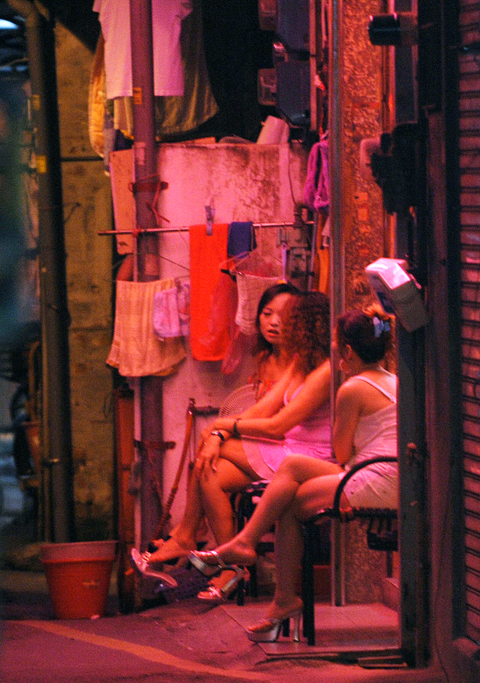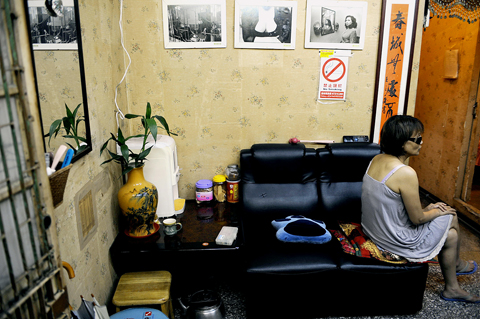Sex workers have cautiously welcomed a government plan to legalize prostitution, but the scheme is being opposed by an alliance of women’s groups who fear it will breed crime and violence.
A legal sex zone similar to Amsterdam’s famed red-light district has been proposed for Taipei, with legal and zoning measures due in place within six months.
Prostitutes and their supporters say they see a ray of hope after many years of campaigning for legalization to protect them from both customers and police, but some are concerned about being moved into special zones.

PHOTO: AFP
“I hope the government will allow us to stay where we are and give us legal protection,” said one prostitute who wanted to be identified as Hsiao-feng. “I don’t want to move to a new place to start again.”
Hsiao-feng earns a living in Wanhua District, which is believed to be home to thousands of sex workers plying their trade illegally even though prostitution was outlawed in the city in 1997.
“Who wants to have red-light districts near their homes?” she said. “The government would have to put us in the mountains but then we can’t make a living because nobody wants to travel that far.”

PHOTO: AFP
Observers say paid-for sex remains big business and the ban has only driven it underground, where brothels operate under euphemistic names such as teahouses, massage parlors, clubs and even skin-care salons.
There are also women known as liu ying (流鶯, floating orioles) — a metaphor for flirtatious and seductive women — who find patrons on the streets.
There is no official record on the scale of Taiwan’s sex industry but the advocacy group Collective of Sex Workers and Supporters (COSWAS) estimates that it involves 400,000 people and is worth NT$60 billion (US$1.8 billion) a year.
“Right now we are helpless when customers don’t pay, or even rob or hurt us,” Hsiao-feng said. “We have to watch out for the police and their informants because we can end up in prison if caught.”
Prostitutes face three days in detention or a fine of up to NT$30,000 if arrested, while their clients go unpunished.
“The government should protect sex workers’ human rights and stop treating them like criminals,” COSWAS chief Chung Chun-chu (鍾君竺) said. “It should allow a blanket decriminalization to regulate the sex trade.”
The public is divided on the issue, with 42.3 percent supporting the plan to legalize prostitution while 38.8 percent oppose it and the rest are undecided, a poll by the Chinese-language China Times found.
Arielle Su, an elementary school teacher in Taipei, says legalizing the sex trade cuts both ways.
“I think it can help prevent sex crimes as some people have needs and they would prey on the general public if they are unsatisfied,” she said. “But as a mother and a teacher I am also concerned that it would corrupt morals.”
A dozen local women’s groups have formed an alliance against legalizing prostitution, warning that it would encourage crime and injustice against women.
“We oppose making prostitution a legal industry because it fosters sexual violence and exploitation of women,” said Chi Hui-jung (紀惠容), head of The Garden of Hope Foundation.
Chi said that the Dutch authorities were reducing the size of Amsterdam’s red-light district because of concern over criminal activities such as human smuggling and money laundering.
“The government should offer welfare programs and job incentives to women so they won’t go into prostitution out of economic desperation,” Chi said.
Hsiao-feng, a 45-year-old divorcee, says it is difficult for streetwalkers like her, with little education and few job skills, to find regular work.
“I don’t like what I do for a living but I have to raise my children and pay the bills. I don’t regret becoming a sex worker. I just hope the government will protect my safety so I am not always at the mercy of others,” she said.

Taiwan is to commence mass production of the Tien Kung (天弓, “Sky Bow”) III, IV and V missiles by the second quarter of this year if the legislature approves the government’s NT$1.25 trillion (US$39.78 billion) special defense budget, an official said yesterday. Commenting on condition of anonymity, a defense official with knowledge of the matter said that the advanced systems are expected to provide crucial capabilities against ballistic and cruise missiles for the proposed “T-Dome,” an advanced, multi-layered air defense network. The Tien Kung III is an air defense missile with a maximum interception altitude of 35km. The Tien Kung IV and V

The disruption of 941 flights in and out of Taiwan due to China’s large-scale military exercises was no accident, but rather the result of a “quasi-blockade” used to simulate creating the air and sea routes needed for an amphibious landing, a military expert said. The disruptions occurred on Tuesday and lasted about 10 hours as China conducted live-fire drills in the Taiwan Strait. The Civil Aviation Administration (CAA) said the exercises affected 857 international flights and 84 domestic flights, affecting more than 100,000 travelers. Su Tzu-yun (蘇紫雲), a research fellow at the government-sponsored Institute for National Defense and Security Research, said the air

A strong continental cold air mass is to bring pollutants to Taiwan from tomorrow, the Ministry of Environment said today, as it issued an “orange” air quality alert for most of the country. All of Taiwan except for Hualien and Taitung counties is to be under an “orange” air quality alert tomorrow, indicating air quality that is unhealthy for sensitive groups. In China, areas from Shandong to Shanghai have been enveloped in haze since Saturday, the ministry said in a news release. Yesterday, hourly concentrations of PM2.5 in these areas ranged from 65 to 160 micrograms per cubic meter (mg/m³), and pollutants were

Taiwan’s armed forces have established response protocols for a wide range of sudden contingencies, including the “Wan Chun Plan” to protect the head of state, the Ministry of Defense (MND) said today. After US President Donald Trump on Saturday launched a series of airstrikes in Venezuela and kidnapped Venezuelan President Nicolas Maduro, concerns have been raised as to whether China would launch a similar “decapitation strike” on Taiwan. The armed forces regularly coordinate with relevant agencies and practice drills to ensure preparedness for a wide range of scenarios, Vice Minister of National Defense Hsu Szu-chien (徐斯儉) told reporters before a